
Main Page
Alphabetical Menu
Chronological Menu
|
Babies  This mildly and curiously engaging documentary follows four babies from around the world over the course of one year. The babies include Bayarjargal in Mongolia, Mari in Tokyo, Ponijao in Namibia, and Hattie in San Francisco. Not surprisingly, the babies often cry when they’re not playing around or taking a nap. It takes a while to get even remotely absorbed into the film because this isn’t a traditional documentary in the sense that there’s sparse dialogue and no narration or some sort of compelling structure to be found. Director Thomas Balmes cuts back and forth between footage of each of the four babies while allowing for the sights and sounds to speak for themselves. The editing does tend to be slightly distracting, though, because while you’re in the process of getting used to watching one baby, he abruptly cuts to the footage of the next baby. At first, watching these babies being, well, babies feels trivial and even a bit boring, but as the film progresses, you’ll gradually observe their personalities come about and find them tugging at your heart enough to keep you somewhat engrossed. You may even find yourself forgetting that they’re actually babies because they’re so full of expression, curiosity and life. Some of them are even funny in the idiosyncratic ways that they behave, such as one of them, Bayarjargal, who plays with a roll of toilet paper and eats bits of it. In another scene, Bayarjargal’s mother washes him in a tub where, at one amusing point, a goat shows up at the entrance of the yurt to take a sip from the water. While it’s somewhat interesting to watch and to be awed by all the footage, it eventually grows a bit repetitive and bland as you’re waiting for at least a modicum of insight or narration to propel the film and add some much-needed intellectual depth. Sure, there’s an emotional depth because it’s easy to feel the compassion that the mothers show to their babies and how infinitely adorable the babies look and behave. It would be interesting if Balmes were to document the lives of these very same babies once they’re in their teenage years to observe how they might evolve and how their personalities might change, or, perhaps, stay fundamentally the same. Fortunately, Balmes keeps Babies at a brief running time of only 1 hour and 19 minutes, so it never overstays its welcome and manages to be curiously engaging, heartfelt, funny and amusing at times, but without much-needed insight, it leaves you feeling unenlightened and slightly underwhelmed. 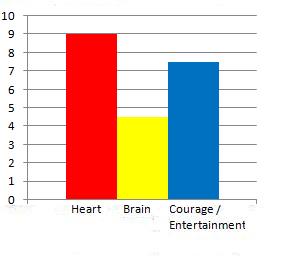 Casino Jack and the United States of Money 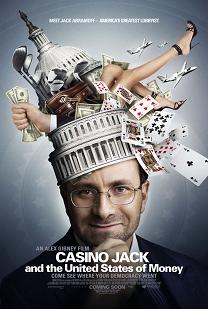 This provocative albeit not surprising documentary charts the rise and fall of Jack Abramoff, a former Republican lobbyist who was sentenced to serve prison time for swindling $7 million from Native American casinos from 2001-2003. He also bribed numerous public officials as well as congressmen to pave his way into becoming more powerful and rich. On top of that, he ruined the economy in the Northern Marianas Islands when he used his money and lobbying power, legally, to allow for slave labor in the garment manufacturing industry there, leaving. Director Alex Gibney, who previously directed Enron: The Smartest Guys in the Room and Taxi to the Darkside, doesn’t offer any new information or shocking revelations for that matter, but he does do a terrific job of assessing all the facts and background information about Abramoff to track his path toward greed, corruption and hunger for power. Gibney also gives audiences a glimpse of the larger picture by showing how Abramoff was a rotten apple among other rotten apples in a system that essentially made it easy for him to be so corrupt. There’s more to Abramoff than meets the eye, so he’s not simply a crook just like any other crook---he’s a crook who used legal means to be able to commit his crimes. He might have been arrest earlier or unable to commit those crimes had there been stricture regulations regarding lobbying in America. He was an idealist at his core and was quite passionate that was he was doing was the right thing to do. Perhaps he was a psychopath whose moral judgments were blurred. Interviews with House Majority Leader Tom Delay, former Representative Bob Ney, former-aide-turned lobbyist Neil Volz and others further help to shed light on Abramoff’s path of destruction. Sadly, to this very day, that path can still be followed with similar destruction by another power-and-money-hungry lobbyist because regulations haven’t really changed enough to put an end to the corruption. Gibney could have edited trimmed down some of the interviews which eventually feel repetitive toward the end and make the film drag a bit, but at least, through the stylish visuals, editing and musical score, there’s rarely a dull moment to be found. At a running time of 2 hours, Casino Jack and the United States of Money occasionally drags and offers nothing surprising or new, yet it remains intriguing and provocative thanks to Gibney’s easy-to-follow and comprehensive assessment of Abramoff’s rise and fall to power. 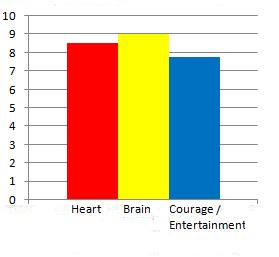 DDR/DDR  This compelling and illuminating cinematic essay focuses on what it was like to live in the Deutsche Democratic Republic (DDR) before the fall of the Berlin Wall in 1989/1990and after the fall when socialism gave way to a capitalistic market economy. The period that marked the changeover is referred to as Die Wende, although its meaning goes beyond merely the words “change” or “reunification.” Before Die Wende, the Stasi, the secret police of the DDR, frequently surveilled, observed, wiretapped, spied on and interrogated East German citizens suspected of any kind of DDR-activity. Even the use of psychoanalysis was prohibited, although two psychoanalysts interviewed here explain how a form of group therapy was conducted in DDR, but it wasn’t referred to as psychoanalysis. The exercises that the groups practiced are concurrently interesting and disturbing because they involved members of the group trying to bring down its leader. Those expressed dissent were belittled to the point of being depressed. No one in the group even considered to discuss the horrors taking place in their country regarding the fascist tactics of the Stasi. A former DDR citizen hits the nail on the head when he says that The United States of America post-9/11 is headed toward a similar police state where the liberties of citizens become stripped away step-by-step. In a fascinating interview, one of the psychoanalysts recalls how she found out after De Wende that a colleague of hers was working as an IM, a.k.a. an informal spy, for the Stasi, confronted him about him, and ended up getting him into trouble so that he was no longer able to practice psychoanalysis. Director Amie Siegel also combines footage of the Stasi interrogations, surveillance and wiretapped conversations which are all quite chilling. She asks a former member of the Stasi to recall how he observed East German citizens and to explain the precise difference between the term “observation” and “surveillance”, which is a form of observation. A German who lived through De Wende candidly says that it was very hard to find a job after the fall of the wall and that many Germans went through a phase of fear as well. Siegel deviates a bit from that provocative subject matter when when she suddenly explores how the subculture of East Germans practicing Native American tribal rituals, i.e. living in teepees, evolved from the pre-De Wende and post-De Wende, along with the amusing Indian Westerns produced in the DDR. The documentary comes full circle with the image of a DDR lifeguard station which is shown in the beginning of the film as well, but its significance finally becomes clear when it reappears toward the end of the film. At a running of 1 hour and 15 minutes, DDR/DDR manages to be a thorough, well-researched essay that’s concurrently disturbing, compelling and profoundly illuminating. 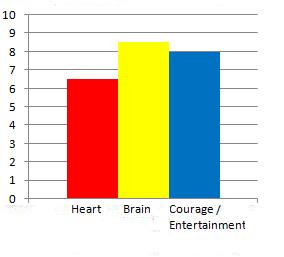 Floored 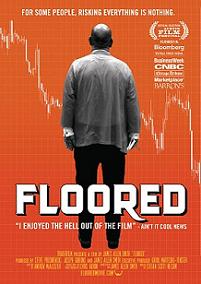 This provocative documentary focuses on the Chicago Board of Trade and how it adapted during the boom of the internet. Before the boom, trades took place on the trading floor where traders yelled a lot, spit at each other and even went to the extent of stabbing one another with pens. Many of those traders have lost their jobs because ever since the internet became the new medium for trading. Director James Allen Smith provides a glimpse of what the trading floor was truly like via fascinating interviews with traders who lived through it to tell the important tale, and it's interesting to hear how it has evolved throughout these years. At a running time of only 1 hour and 17 minutes, Floored could have tackled its subject matter more extensively, but it nonetheless remains an intriguing and timely documentary. 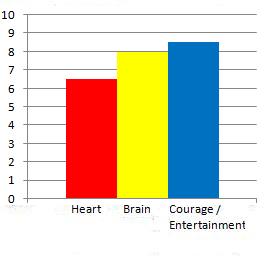 Gravity Was Everywhere Back Then 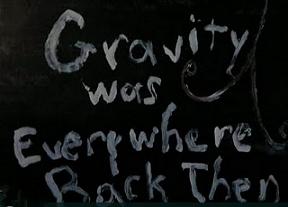 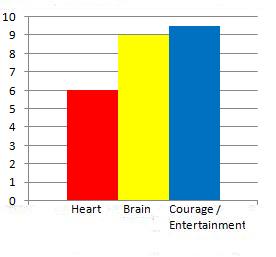 Happiness Runs 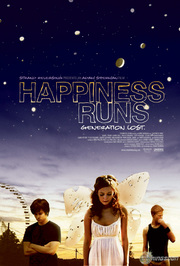 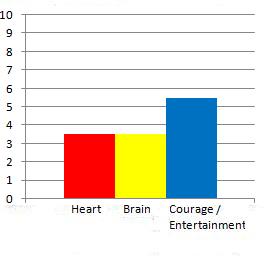 Iron Man 2 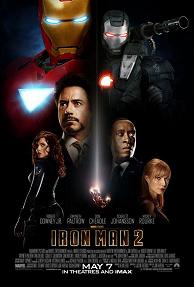 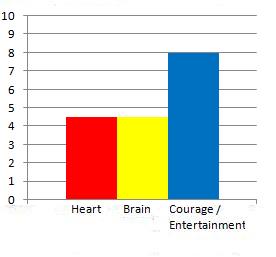 Mother and Child 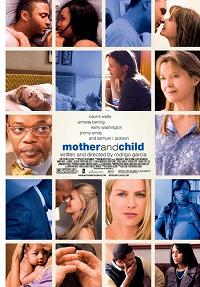 Fifty-one-year-old Karen (Annette Bening) works as a physical therapist at a nursing home and lives with her ailing mother, Nora (Eileen Ryan). When her mother dies, she becomes bitter and starts regretting that she had given up her baby for adoption when she was only fourteen-years-old. At work, there’s a co-worker, Paco (Jimmy Smits), who often flirts with her even though she’s as tough as a cookie and rude to him. Lucy (Kerry Washington) wants to be a mother, but can’t conceive a child, so she and her husband, Joseph (David Ramsey), want to adopt a child from a Catholic adoption agency with the help of Sister Joanne (Cherry Jones) who introduces them to a twenty-year-old pregnant girl who may or may not let them adopt her child. In the final subplot, Elizabeth (Naomi Watts), moves to Los Angeles where she accepts a job at a law firm headed by Paul (Samuel L. Jackson) whom she starts a sexually-charged affair with and ends up pregnant with his child. Writer/director Rodrigo García has written such a multilayered, intriguing narrative that could have been convoluted had it not been for its delicate, intricately structured screenplay. García clearly trusts the audience’s intelligence because he doesn’t reveal everything about Karen, Lucy and Elizabeth right away. Even though you have a hunch that the three plot strands will somehow ultimately connect, it’s still interesting to watch precisely how they will do so. At times, some of the dramatic scenes veer toward soap opera territory, though, and could have used a bit more nuance. The convincingly moving performances of Annette Bening, Naomi Watts and, particularly, Kerry Washington hold the film together like glue and keep you immersed for the most part in the intertwining stories. It’s also worth mentioning the very exquisite cinematography and terrific editing as the narrative switches back and forth between the lives of those three women, each of whom comes across as a complex, fragile and flawed human being. At a running time of just over 2 hours, Mother and Child manages to be tender, heartfelt and intriguingly structured albeit occasionally melodramatic. Annette Bening, Kerry Washington and Naomi Watts shine in their captivating, raw and brave performances. 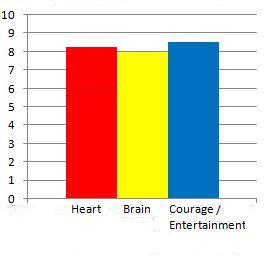 Multiple Sarcasms 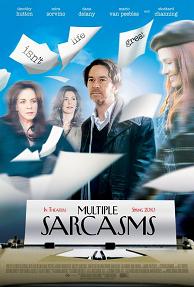 During the late 1970’s, Gabriel Richmond (Timothy Hutton) appears to have everything he has ever wanted in his life: a house, car, supportive wife, Annie (Dana Delaney), a daughter, Elizabeth (India Ennenga) and a successful career as an architect. However, he’s going through a mid-life crisis phase that makes him unhappy and questioning his relationships with everyone around him. He decides to write a play based on his life even though he has never been properly schooled in playwriting or theater for that matter. Pamela (Stockard Channing), his good friend and agent, struggles to find someone to produce the play. Meanwhile, Gabriel resorts to alcohol as a solution for his problems and for some reason thinks that he’s in love with his best friend since childhood, Cari (Mira Sorvino). It’s a mystery how anyone can put up with Gabriel to begin with because he comes across as a narcissistic, annoying, dull, mentally unstable, stubborn and unreliable individual who needs a heavy dose of psychotherapy. Director/co-writer Brooks Branch, in his feature directorial debut, unevenly combines drama, romance and comedy. The screenplay’s main problem, though, is that Gabriel’s narcissism gets tiresome and tedious after a while, and, later, his inevitable attempts to figure out his life and to change as a person are quite inorganic. He’s essentially an adult who has yet to grow up and to face reality like a true grown-up would do. On a positive note, Timothy Hutton does his best to sink his teeth into the role convincingly as does the rest of the fine cast in their respective roles. Branch doesn’t give enough leeway into Gabriel’s thoughts and feelings, though, so you’ll find yourself at an emotional distance from him and, for the most part, you’ll want him to bang his head against the wall for being so stupid and naïve in his approach to dealing with his midlife crisis. The film feels so rushed and takes the easy road in the third act that not a single scene feels authentic or warranted because it’s difficult to believe that Gabriel has truly changed innately. At a running time of 1 hour and 37 minutes, Multiple Sarcasms is an often uneven, inorganic drama centered around a dull, tediously narcissistic character who’s as irritating as nails on a chalkboard. 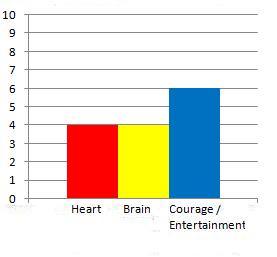 My Name is Khan  (Please click here to read an article about the cover-up of hidden MSG and its potential links to autism as well as other neurodegenerative disorders.) 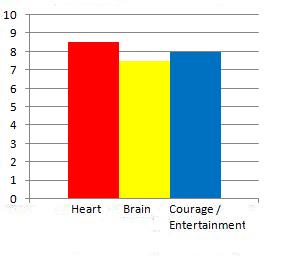 Ocean of Pearls 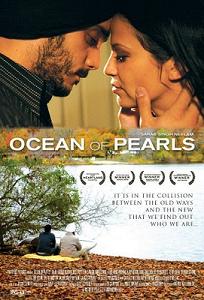 Amrit Singh (Omid Abtahi) lives with his family in Toronto and works as a doctor. His parents immigrated to Toronto from India back in the 60’s, so, in voice-over narration, he wonders why anyone would choose to work so diligently in a new country while continuing to live in one’s old country. That’s quite an intelligent and provocative question that many people around the world can relate to in many ways. A doctor from Detroit, Dr. William Ballard (Ron Canada), persuades him to leave his family and girlfriend, Smita (Navi Rawat), and move to Detroit to accept a prestigious job as a transplant surgeon there. He accepts the job without informing Smita or his family because he’s tempted by the hefty salary offered and, on top of that, he’s genuinely passionate about his work. Right when he goes through a security checkpoint at the airport, security officers ask him to remove his turban which he refuses to do and ends up being interrogated in a private office before boarding the plane. His turban also poses as an obstacle in his dream of becoming the Chief of transplant surgery at the hospital because he’s looked down upon for wearing it, especially by Dr. Ryan Bristol (Todd Babcock), his intimidating and bigoted colleague who competes with his for the coveted job. Amrit constantly finds himself torn between tradition verses change or verses other values such as his own career. He even goes to the extent of taking off his turban and cutting off his hair which he hides from Smita when she visits him. Will he yield to the temptations of Susan Clark (Heather McComb), the hospital’s Administrator who flirts with him or will he stick to his values by not cheating on his girlfriend? Another conflict arises for him when a patient desperately needs a transplant operation that might save her life, but she can’t afford the operation. Will he go against protocol by allowing her to go through the operation and thereby following his moral conscience or will he succumb complacently to the wishes of the greedy insurance company and hospital? Director/co-writer Sarab Neelam tacks on so many conflicts for Amrit that you’ll find yourself wondering how all of the solutions will come about during the film’s 97-minute running time. Not surprisingly, the plot feels overstuffed and offers oversimplified solutions that play it too safe without enough bite against the horrors of the corrupt healthcare system in the United States. A decent performance by Omid Abtahi elevates the film slightly from complete blandness, but, for the most part, the formulaic screenplay’s wheels can be heard turning during pretty much every scene. There’s nothing inherently wrong with following a formula as long as the audience stays entertained and has at least a few surprises in stock for them. Unfortunately, Neelam takes so many liberties and veers toward contrivance when it comes to the solutions to Amrit’s serious dilemmas that plausibility diminishes as the plot progresses and, therefore, the scenes meant to tug at your heartstrings feel too forced. Ocean of Pearls is a provocative, well-acted and moderately heartfelt drama that suffers from lack of bite and boldness while resorting to oversimplifications, facileness and contrivance. 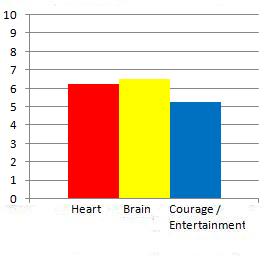 Main Page Alphabetical Menu Chronological Menu ______________________________________________________ |
The NYC Movie Guru
themovieguru101@yahoo.com
Privacy Policy